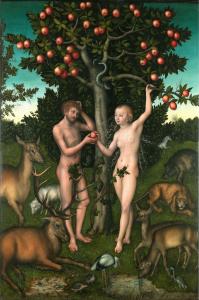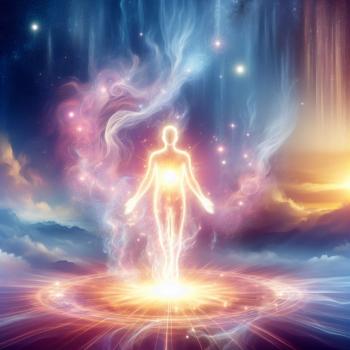“This communion which the saints have with Christ doth not make them in any wise partakers of the substance of his Godhead, or to be equal with Christ in any respect: either of which to affirm is impious and blasphemous.” (WCF 26.3)
The First Temptation and Unbelief
Do you remember the first temptation? It is the same temptation that comes at us still today. “You can be as God knowing good and evil.” How could Adam and Eve have known if this was true or not? In fact, I’ve been told that it is true and that the only problem is that the serpent was not in a place to offer divinity. But, according to this view, if Adam and Eve did what God wanted, then God would make them into Gods as well. Is that right? Was it true they could be God but wrong to accept it from the serpent? Some in the occult say that they did indeed become Gods that day by allowing Lucifer to open their eyes. How are orthodox Christians to make sense of all of this?
Only God is God
We start here: only God is God. God alone is infinite, eternal, and unchangeable. The creature can never become God. Nor can the creature know good and evil the way God knows these. God determines good and evil, whereas we creatures discover good and evil. The serpent was offering something that is logically impossible to have. It was a test of their understanding, and they failed. Many continue to fail today. We could even say we have all failed, and that is why we are told in Psalm 14 that none seek, none understand, and none do what is right. We must be redeemed from our unbelief.
Adam and Eve could have, and should have, known this just like we too can and should know it. God existed from eternity we did not. God created us not we ourselves (Psalm 100). The urge to be God and ignore the true and living God has been behind all sin and vain philosophy ever since the fall. And that sin is inexcusable precisely because the distinction between God and the creature is clear. Unbelief is without excuse.
Defining “God”
But could we become God in another sense? Could we become God in the sense of being holy? It is more accurate to say we are united to God. In order to understand what that means, let’s compare the nature of God and the nature of man. Westminster Shorter Catechism Question 4 defines God this way: God is a Spirit, infinite, eternal, and unchangeable, in being, wisdom, power, holiness, justice, goodness, and truth. There are three parts to this definition. First, God is a spirit and not corporeal. Second, the incommunicable attributes of God (infinite, eternal, and unchangeable). These are the basis for the aseity of God. Only God has these attributes. And this is why it is so dangerous to say we become God. Care needs to be taken to avoid confusing God and the creature.
The third part of that definition is the attributes that God can give to a creature. We can have being, wisdom, power, holiness, justice, goodness, and truth. But we can only have these as finite, temporal, and changeable creatures. It might help to introduce the distinction between the broader and narrower aspects of human nature.
The Broader and Narrow Aspect of God
The broader aspect parallels the definition of God above. All humans are finite, temporal, and changeable in their being, wisdom, power, holiness, goodness, justice, and truth. Sometimes it is said that this is the sense of the image of God that all humans always have and even retain after the fall.
The narrower aspect is knowledge, holiness, and righteousness. Man was created with these (but changeable) and lost them in the fall. All humans have these categories in their thinking (hence the study of the holy and the profane in the world’s religions by anthropologists), but after the fall, you must be regenerated to have them again.
Justification, Adoption, Sanctification, Glorification
And that is where we come to the categories that the Westminster Confession used instead of deification. You won’t find a chapter on deification there. But you will find these ideas: justification, adoption, sanctification, and glorification. I encourage you to read the Confession on your own and the accompanying questions in the Larger Catechism about these topics. This will help you avoid mistakes that can easily accompany talk of becoming God.
What does it mean to become like God? It cannot mean metaphysically in the sense of infinite, eternal, and unchangeable. It must mean with respect to the narrower aspect of human nature. And that is what sanctification and glorification are about. Sanctification is “the work of God’s free grace, whereby we are renewed in the whole man after the image of God, and are enabled more and more to die unto sin, and live unto righteousness.” And then, at death, “The souls of believers are at their death made perfect in holiness, and do immediately pass into glory; and their bodies, being still united to Christ, do rest in their graves till the resurrection.” And then it is at the resurrection that believers are made perfectly blessed and have the full enjoyment of God to all eternity.
What does “perfectly” or “made perfect” mean in this context? It doesn’t mean “infinite, eternal, and unchanging.” Humans remain finite and temporal (they had a beginning and are limited in their knowledge, holiness, and righteousness). But believers in this condition are without sin. They no longer have the admixture of sin and holiness that is the state of a justified but not yet sanctified believer. This leads us to the four-fold state of man.
The Four-Fold State of Man
There is a sense in which we can become unchangeable. Not metaphysically unchangeable. But unchangeable by being established in the covenant. Augustine identified the four-fold state of man, and you will see this same four-fold state in the Westminster Confession’s chapter on free will. It is: 1) possible to sin, 2) not possible not to sin, 3) possible to not sin, 4) not possible to sin. In that fourth state, the believer can no longer sin. In that sense, they are unchangeable. But they continue to change in that they live one moment after another and have one thought after another. A believer can be unchangeably established in the covenant but still metaphysically changeable. They are finite, temporal, and changeable in the way that creatures always will be.
Didn’t they become Gods?
One last objection. Doesn’t God say in Genesis 3:22 that Adam and Eve did indeed become Gods? This is a good opportunity for you to learn how to interpret (hermeneutics). Did God mean that Adam and Eve became eternal (without a beginning)? Clearly not. But why? They had a beginning. Were they now infinite? No. But why not? They still only have finite knowledge. Unchangeable? Still no. Why not? They continue to think one thought after another and live one moment after another. Were they now infinite? No. Unchangeable? Still no.
So, what does this passage mean? It is with respect to determining good and evil for themselves. It is not a comment on whether they can successfully do this. We just read that they were cursed and that death was imposed on the world due to their attempt to do so. They have started to determine good and evil for themselves rather than looking to God as the source of the distinction between good and evil.

What about you?
Now, could you respond to the serpent? What if someone comes to you today and tells you that you can be God one day? You have the tools to show how this is impossible. When Christians have used these kinds of terms, you will find they meant one of these things above. But you will also find that such talk is not in the Westminster Confession. In fact, in chapter 26.3 it says this: “This communion which the saints have with Christ doth not make them in any wise partakers of the substance of his Godhead, or to be equal with Christ in any respect: either of which to affirm is impious and blasphemous. Nor doth their communion one with another, as saints, take away or infringe the title or propriety which each man hath in his goods and possessions.”
Adam and Eve could and should have known they could not be God and could not know good and evil the way God did. They should have been able to show that only God is eternal and that humans are created. Their failure to know the difference between God and the creature was the first sin. Can you show that only God is eternal and that no creature can become God?













